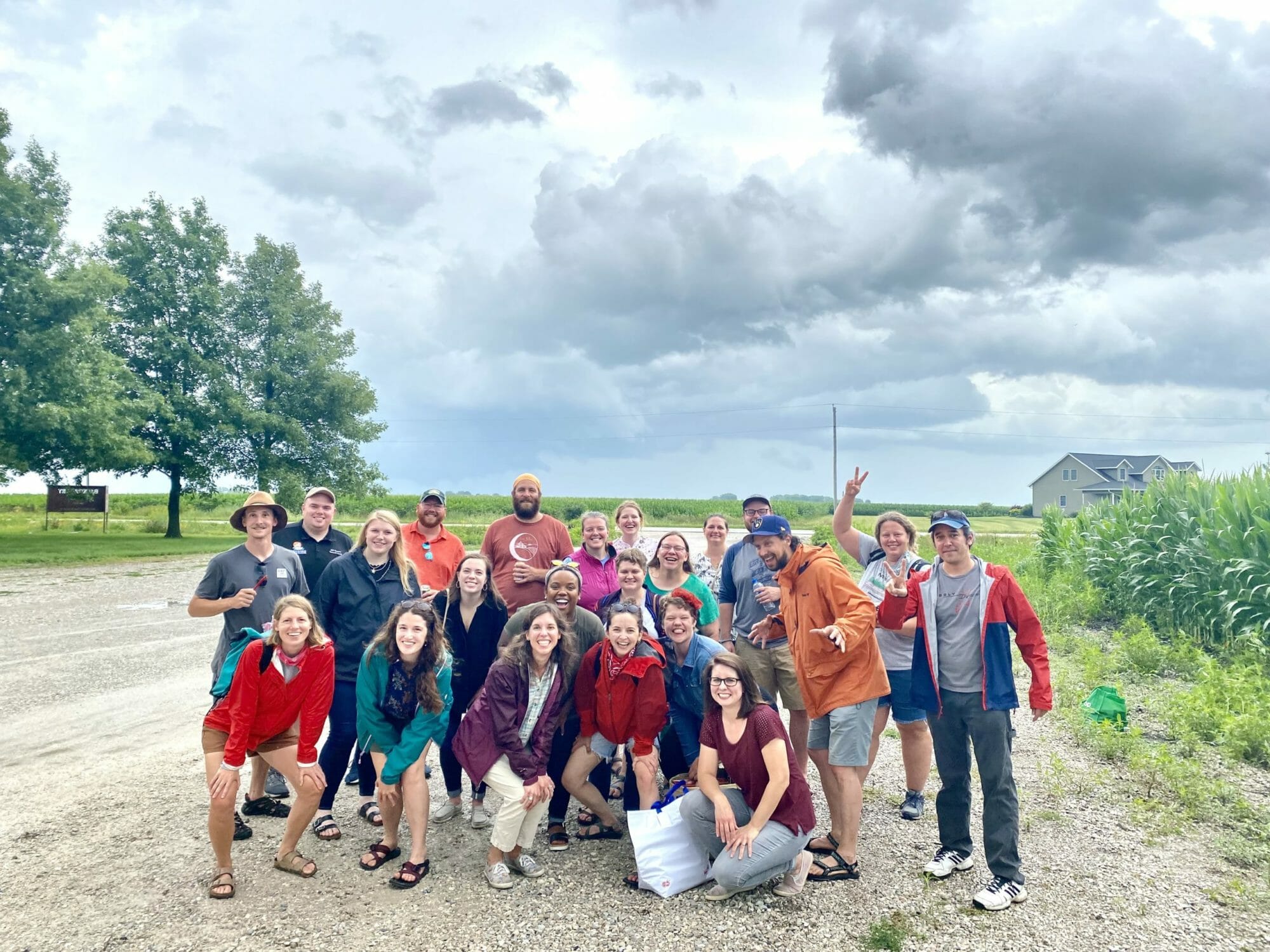Connecting Islands of Resilience
Over the summer, the PFI board and staff gathered to participate in a training led by long-time supporters and members Ricardo Salvador and Andrea Basche. Ricardo is a senior scientist with the Union of Concerned Scientists and directs its Food & Environment Program, and Andrea is an assistant professor in the Department of Agronomy and Horticulture at the University of Nebraska-Lincoln.

Several PFI staff members gather at Backcountry Winery & Brewery in Stratford, Iowa, on July 14 for the
first in-person staff party since 2019. The event was capped off by a tornado that touched ground close to
Stratford and sent staff briefly into the winery’s tornado shelter.
The training session, titled “Exploring PFI’s Role in Shaping the Culture of Agriculture,” was adapted from a short course Andrea has been teaching, and she and Ricardo taught us some of the stark history of agriculture that has brought us to the system we find ourselves in today – one that is not diverse in crops, or in the people that comprise Iowa’s farmers.
As we discussed this complex topic and PFI’s role in shaping agriculture in Iowa, we had a candid conversation about our progress to date. PFI members are creating islands of diverse and resilient agriculture among a very homogenous ag landscape. As we look forward, how do we grow or connect these islands to provide solid architecture for the expansion of resilient farms and communities across Iowa?
During the training, Ricardo refreshed us on the root of economics: land, labor and capital. These elements comprise the foundation of all economics, a social discipline established in the 18th century, and their presence in farming is glaringly obvious. Afterward, my colleague Sarah Carlson continued the conversation over email. She wrote: “Land access is, and should be, our next hairy thing to work on. Without land we can’t break down the concentration of wealth and help redistribute it away from consolidation to the systems we want to see. We won’t ever have all the money to do this, but we don’t need it if we have the people. We need the eaters, the PFI board, staffers, the farmers and the businesses who want to actually make a new food system.”
By the time you’ve read this, we’ll have created a land access needs assessment and action plan that will hopefully make a dent in the continued consolidation of farmland. In our work with beginning and aspiring farmers, we consistently hear that access to land is the top barrier. Simultaneously, farm transfer is imminent: According to Iowa State University, 60% of Iowa farmland is owned by people over the age of 65, and 35% is owned by those older than 75 years of age.
Farmland in Iowa is changing hands and will continue doing so at an accelerating rate. But beginning farmers have the potential to revitalize communities, improve access to healthy food and bring diversity to Iowa’s landscape. Creating more land access is integral to PFI’s mission to equip farmers to build resilient farms and communities. Here are a few notable facts about why land access is so hard:
- More than half of Iowa’s farmland is owned by non-operators
- Two-thirds of Iowa’s farmers have not identified a successor
- 75% of new farmers aren’t related to preceding farmers and farmland owners
- Land ownership is often transferred after death to avoid capital gains
- Most farmland is being sold above production value; market value is greatly inflated due to competition from other farmers and from development.
- Only about 2% of farmland changing ownership between 2015 and 2019 was listed on the open market
Yet, there’s hope ahead. People across the country realize the potential that creating land access has for our food and farm systems and are finding creative ways to help farmers access land. Groups in Iowa like Sustainable Iowa Land Trust are already making land more affordable through easements and long-term ground leases. We are working with partners to come up with some bold actions to create more land access in Iowa.
Check back to learn more, and please help us create a future that includes diversity of farming enterprises and the people that farm it. Together, we can both grow and connect our islands of resilience to put robust culture back into Iowa’s agriculture.
